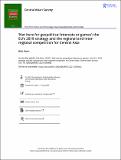Files in this item
'Not here for geopolitical interests or games' : the EU's 2019 strategy in the regional and inter-regional competition for Central Asia
Item metadata
| dc.contributor.author | Fawn, Rick | |
| dc.date.accessioned | 2021-08-25T09:30:02Z | |
| dc.date.available | 2021-08-25T09:30:02Z | |
| dc.date.issued | 2021-08-17 | |
| dc.identifier | 274934350 | |
| dc.identifier | 5dad4284-54b7-4b2b-9e79-b7e21556e37b | |
| dc.identifier | 000685797900001 | |
| dc.identifier | 85106038097 | |
| dc.identifier.citation | Fawn , R 2021 , ' 'Not here for geopolitical interests or games' : the EU's 2019 strategy in the regional and inter-regional competition for Central Asia ' , Central Asian Survey , vol. Latest Articles . https://doi.org/10.1080/02634937.2021.1951662 | en |
| dc.identifier.issn | 0263-4937 | |
| dc.identifier.other | ORCID: /0000-0003-1903-8773/work/99115847 | |
| dc.identifier.uri | https://hdl.handle.net/10023/23831 | |
| dc.description | This work was supported by research project ‘Contested Global Governance, Transformed Global Governors? International Organisations and “Weak” States’ (GLOBALCONTEST), funded by the French National Research Agency [grant number: ANR-16-ACHN-0034]. | en |
| dc.description.abstract | The European Union’s (EU) 2019 New Strategy for Central Asia and joint meetings with Central Asia’s five foreign ministers established standards and expectations for mutual relations. Throughout those initiatives and proclamations, the EU stresses its un-geopolitical essence and behaviour, including the statement that affords the article’s title. The article identifies five issue areas that demonstrate that, despite declarations otherwise, the EU reasons and acts geopolitically in this contested region: (1) the promotion of Central Asian regionalism; (2) the inclusion of Central Asia in formations beneficial to the EU; (3) selectively in economic and functionalist cooperation; (4) democracy, human rights and civil society promotion; and (5) international education cooperation. The EU identifies its comparative advantage through cost–benefit analyses and seeks to enhance its attractiveness by offering its allies to Central Asia, while excluding other, present actors. That the EU is often outmanoeuvred does not diminish this subtle yet discernible geopolitical conduct. | |
| dc.format.extent | 25 | |
| dc.format.extent | 2050483 | |
| dc.language.iso | eng | |
| dc.relation.ispartof | Central Asian Survey | en |
| dc.subject | European Union | en |
| dc.subject | Central Asia | en |
| dc.subject | EU's 2019 Central Asia Strategy | en |
| dc.subject | EU's 2007 Central Asia Strategy | en |
| dc.subject | Regionalism | en |
| dc.subject | JZ International relations | en |
| dc.subject | T-NDAS | en |
| dc.subject | SDG 4 - Quality Education | en |
| dc.subject.lcc | JZ | en |
| dc.title | 'Not here for geopolitical interests or games' : the EU's 2019 strategy in the regional and inter-regional competition for Central Asia | en |
| dc.type | Journal article | en |
| dc.contributor.institution | University of St Andrews. School of International Relations | en |
| dc.identifier.doi | 10.1080/02634937.2021.1951662 | |
| dc.description.status | Peer reviewed | en |
This item appears in the following Collection(s)
Items in the St Andrews Research Repository are protected by copyright, with all rights reserved, unless otherwise indicated.

